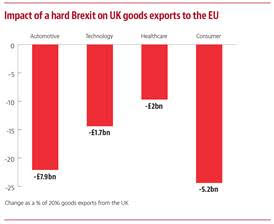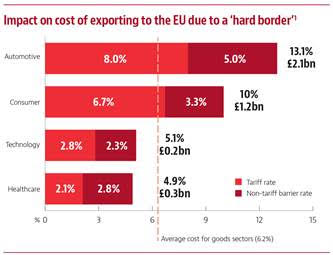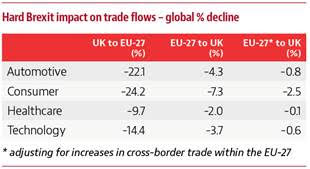- Hard Brexit to create £17billion fall in annual EU export revenues across UK's key manufacturing sectors - £1.7billion fall in annual EU tech revenues
- UK healthcare sector stands to lose almost 10% of its global export revenues owing to reduced EU exports compared with 0.1% for the EU
- UK exports hit at least four times harder than EU exports in key manufacturing sectors
- UK manufacturing exports to five key markets need to increase by 60% to offset 'hard Brexit' EU export losses
A hard Brexit could cost the UK's healthcare, automotive, technology and consumer goods sectors almost £17billion a year in lost EU export revenues, according to a new report.
You can understand why there is now mounting pressure for the UK to negotiate new customs arrangements for post-Brexit trade with the EU and for companies to work with their industry groups to help shape future trading relations
The realities of trade after Brexit, launched today by global law firm, Baker McKenzie, covers four sectors that account for 42% of the UK's manufacturing GDP and 45% of manufactured exports to the EU.
Produced in conjunction with Oxford Economics, the report forecasts the extent to which increases in costs to UK exports could lead to EU consumers switching to a domestically-produced alternative or to a different exporting country, and the subsequent decline in UK export revenues.
The report also considers the best opportunities for the UK with third-country markets outside the EU to offset the potential losses associated with departing the Single Market.

Commenting on the findings, Baker McKenzie Trade partner, Jenny Revis, said: "These figures indicate the extent to which the UK's key manufacturing sectors are likely to be hit by the impact of a hard Brexit.
“You can understand why there is now mounting pressure for the UK to negotiate new customs arrangements for post-Brexit trade with the EU and for companies to work with their industry groups to help shape future trading relations with the EU."
The report highlights that the healthcare sector could be hit with new tariff and non-tariff barrier rates as a result of the imposition of a hard border between the UK and the EU, predicted to total £3.8billion annually across all four sectors.
The cost of non-tariff barriers, which include new compliance paperwork and other administrative requirements, can match, or even outstrip, the tariffs themselves in some sectors, such as healthcare.

"The UK Government has always been against barriers to trade, including non-tariff barriers,” said trade partner, Ross Denton.
“Some would say that the whole raison d'etre for Brexit is to remove obsessive standard-setting, categorisation and licensing of products from the UK, but this certainly won't be the case if we see a hard border between the EU and UK.
Some would say that the whole raison d'etre for Brexit is to remove obsessive standard-setting, categorisation and licensing of products from the UK, but this certainly won't be the case if we see a hard border between the EU and UK
“Companies need to begin quantifying the non-tariff costs so there are no hidden surprises.”
Both the UK and the EU will feel the pinch on trade from the impact of a hard Brexit and from the additional costs from tariff and non-tariff barriers. However, the impact will be significantly greater for the UK, the report warns.
It shows that for the four sectors, the EU accounts for 49% of UK exports, while the UK accounts for just 9% of exports from the EU. This demonstrates that the UK is highly dependant on the EU and, as a result, the proportionate decline in UK exports will be four times the decline in EU exports in these sectors – even before taking into account increased trade within the EU-27.
"The combination of rising prices and softening margins could result in significant trade deficits," said Sunny Mann, another trade partner.

"We are working with many clients to consider if and where they can alter supply chains to reduce their reliance on the EU.”
Denton added: “You can clearly see that the EU exports a lot more broadly, to a whole host of other markets, and, consequently, it is far less dependant on the UK as a market than the UK is on it. This will have significant implications for upcoming negotiations."
Business relocation
In addition to the impact on export revenues; there is a significant risk that companies operating within the healthcare sector could relocate.
In many of the industries modelled by the report, there is a sizeable share of non-EU overseas ownership. These companies were likely motivated to base their operations in the UK because of the Single Market access it offered and could seek to relocate if that market access is revoked, the report states.
Revis said: "Keeping companies in the UK may depend on the willingness of the UK Government to offer incentives to industry, especially where support is needed to offset any new tariffs.
“For the short term, at least, such incentives will need to be balanced with EU rules governing state aid."
According to the report, the projected impact of Brexit will not only lead to changes to capital flow, but also to the labour supply which will be felt across each of the four UK manufacturing sectors.
Keeping companies in the UK may depend on the willingness of the UK Government to offer incentives to industry, especially where support is needed to offset any new tariffs
In the healthcare industry, concern lies not solely with the volume of staff that could be affected by tighter EU immigration controls, but with the proportion of skilled staff whose positions may be in doubt post-Brexit.
Almost 10% of the sector's workforce come from the EU and more than half of that group are in professional and managerial positions.
Indeed, in a study commissioned by Baker McKenzie earlier this year revealed skilled workers from EU-27 Member States said they felt more vulnerable to discrimination since the Brexit referendum, with 56% of those polled indicating they could depart the EU before the end of the two-year negotiation period.
In the healthcare sector, the rate was even higher, with 84% indicating a desire to leave.
Stephen Ratcliffe, Baker McKenzie employment partner, said: "Such rates of departure could leave the industry with a significant skills gap to plug post-Brexit.
“Companies need to look now at how they can support EU staff facing uncertainty over the right to remain in the UK, particularly in light of recent suggestions around the future restrictions on the rights of EU citizens seeking to live and work in the UK."
Ratcliffe added: "The Government can't have a permanent situation in which it's easy to come to the UK to do routine work.
“There's no simple solution, but there is an urgent need for clarity over the types of highly-skilled roles for which longer-term work permits may be obtainable."
The report also examines the third-country trade opportunities in each sector post-Brexit based on the size of global imports to those markets – now and in the decade ahead.
It reveals that, for every sector, the US offers the greatest opportunity, accounting for around half of the entire market in each of the industry sectors. China, meanwhile, presents the second-largest opportunity, with a fair amount of variation between the remaining sectors.
In these countries and sectors, the UK’s market share of imports was 2.1% in 2016. It could need to increase over 60% to offset Brexit-related export losses.
However, domestic markets could also be an important factor in cushioning the impact of falling exports.
"The UK is caught between a rock and a hard place on Brexit,” said Samantha Mobley, London head of EU, competition and trade at Baker McKenzie.
The UK is caught between a rock and a hard place on Brexit. This is a real quandary and the UK Government will need to make some difficult decisions
“Our data shows that the UK needs to begin the very-lengthy process of negotiating Free Trade Agreements with third-country markets now in order to mitigate the cliff-edge effect of the fall in trade, in case no EU agreement kicks in immediately.
“But we can't do this while we're in the EU and have the safety net of an EU transitional period.
“This is a real quandary and the UK Government will need to make some difficult decisions.”
